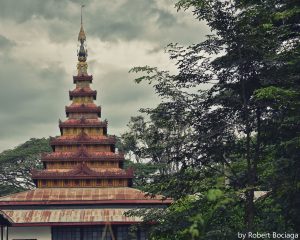The Lords of the Sky were the princes who reigned over the numerous Shan kingdoms scattered across the Shan Plateau between China’s Yunnan province, Northern Laos, Thailand and central Myanmar. The subsequent demise of the power of the Shan rulers tells the story of the failed political reform that is hanging over Myanmar’s approaching elections like the Sword of Damocles.
When Britain began withdrawing from colonies throughout its empire, Shan princes, who were their allies, felt betrayed. They were not consulted on the independence agreement negotiated between General Aung San and Prime Minister Clement Attlee.
To forge national unity, the Panglong Agreement, signed in 1947, enabled the creation of the Union of Burma, which gave the Shans the right to secede after 10 years, if they so wished. In addition, Sao Shwe Theik, the last Shan prince of Yawnghwe (today Nyaung Shwe) was given the ceremonial post of the first president of the Union.
In order to participate in the democratic process, the Shan princes agreed to abandon their hereditary privileges and feudal system, which had already been broadly contested not only by Bamar politicians, but also by the Shan and Pa-O people.
However, all these gestures were based on what turned out to be a highly delusional hope for a high-level of self-administration. A rebellion against the central regime was sparked, but the army conducted a coup with the aim of establishing authoritarian rule. As a result, Sao Shwe Theik and other leaders were thrown behind bars, which buried the aspirations of the ethnic people for decades.
But nowadays, in Myanmar’s 21st century, semi-democratic system, their desires have resurfaced. The question is: Who holds the key to fulfilling them?
Shan State is Myanmar’s largest state, occupying almost a quarter of the country’s total land area. The Shan people are the second largest ethnic group after the Bamar.
The flags and emblems of various national and ethnic parties dot the towns and villages of this mountainous region ahead of the November 8 general elections. Every day, campaign cars with loudspeakers crawl along the hilly roads, frightening the tropical birds.
Yet many people deplore that their ethnic interests cannot be meaningfully represented within the current electoral system. Greater ethnic autonomy hinges on constitutional reform. Currently, the chief minister of Shan State, whose task is to form the government, is appointed not by the party that wins a majority in the state parliament, but by the National League for Democracy-backed president in Naypyidaw.
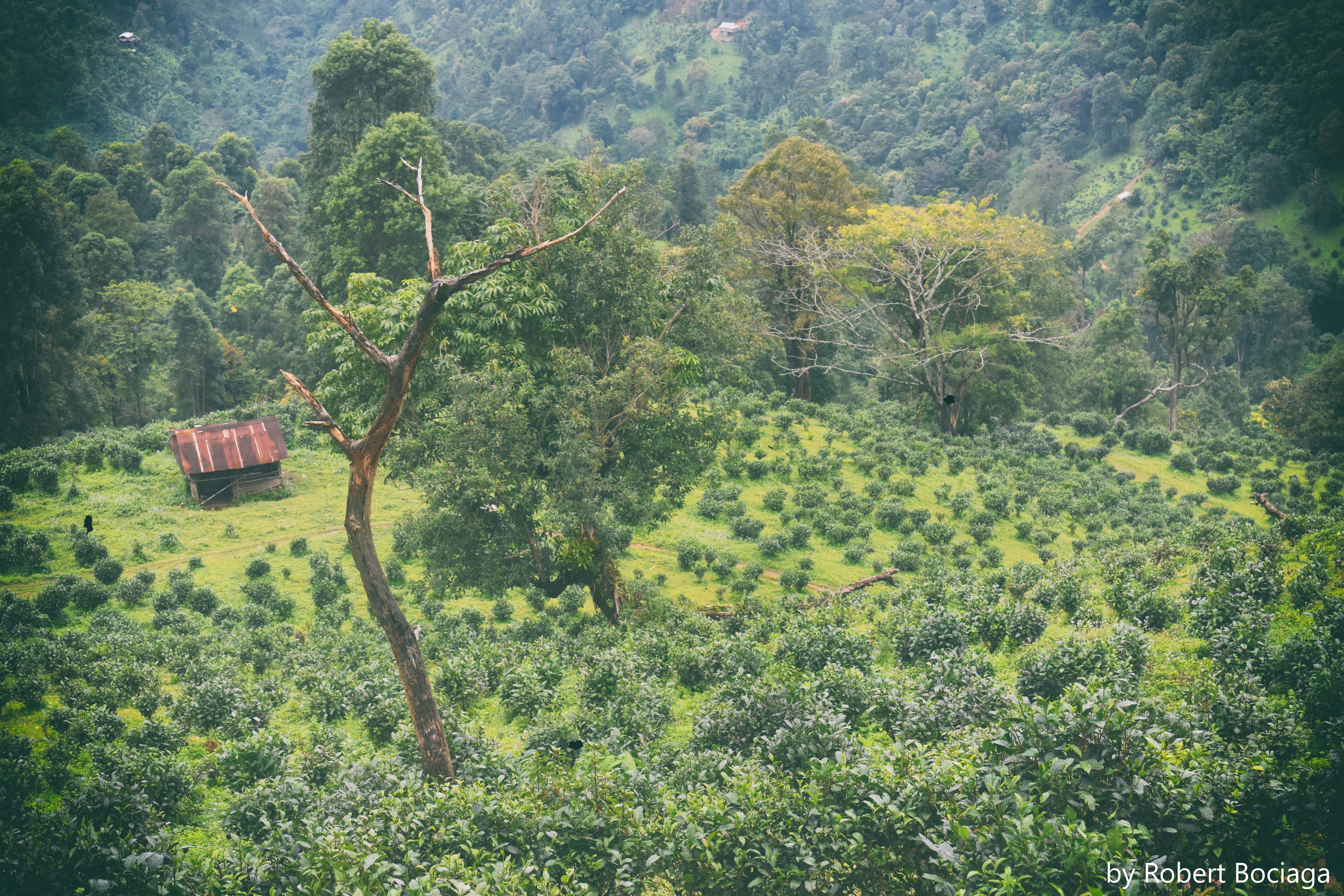
Tea plantations provide an important source of income for the people living in the hill areas, where the armed groups find a hideout. Photo by Robert Bociaga.
But in Shan State, the last elections were won neither by the NLD nor by a Shan party. Instead, the military-backed Union Solidarity and Development Party (USDP) won the day. Some voice the opinion that the USDP’s success may have been caused by the influx of newcomers from central Myanmar. For years, Bamar people have been flowing into Shan State en masse and this process has sharply reshaped both regional and national politics.
“When Bamars started settling down in Aung Ban township, the Shans escaped as they did not want to have them as neighbors,” relates Aung Myo, who has himself migrated to the area for a temporary job assignment. “Many hate speaking Bamar language and their culture.”
The settlement issue is nowadays creating ethnic tensions like never before, running contrary to a history of Bamar-Shan intermingling that dates back to the 14th century. The Shan Plateau has always been populated by a diverse array of ethnic groups. In the past, the Shan princes and their subjects, constituting the largest group in the plateau, were also accused of expanding into new territories.
Apart from Bamars moving into Shan State in search of better opportunities, the state also hosts considerable numbers of soldiers, who were installed to fight rebel groups and secure the border with China. The misbehavior of the soldiers of the Tatmadaw (Myanmar army) has sown the seeds of antagonism, with rapes, looting and extrajudicial killings observed for generations.
Last year in Nahmsan, a town famous for its tea plantations, hundreds of people fled their homes after the Tatmadaw clashed with one of the rebel groups, the Ta’ang National Liberation Army (TNLA). The move went against the commitments of the ceasefire agreement and was considered a provocation. Even now, in the midst of the COVID-19 crisis, the Tatmadaw engages in periodic skirmishes with the TNLA in several towns of northern Shan State.
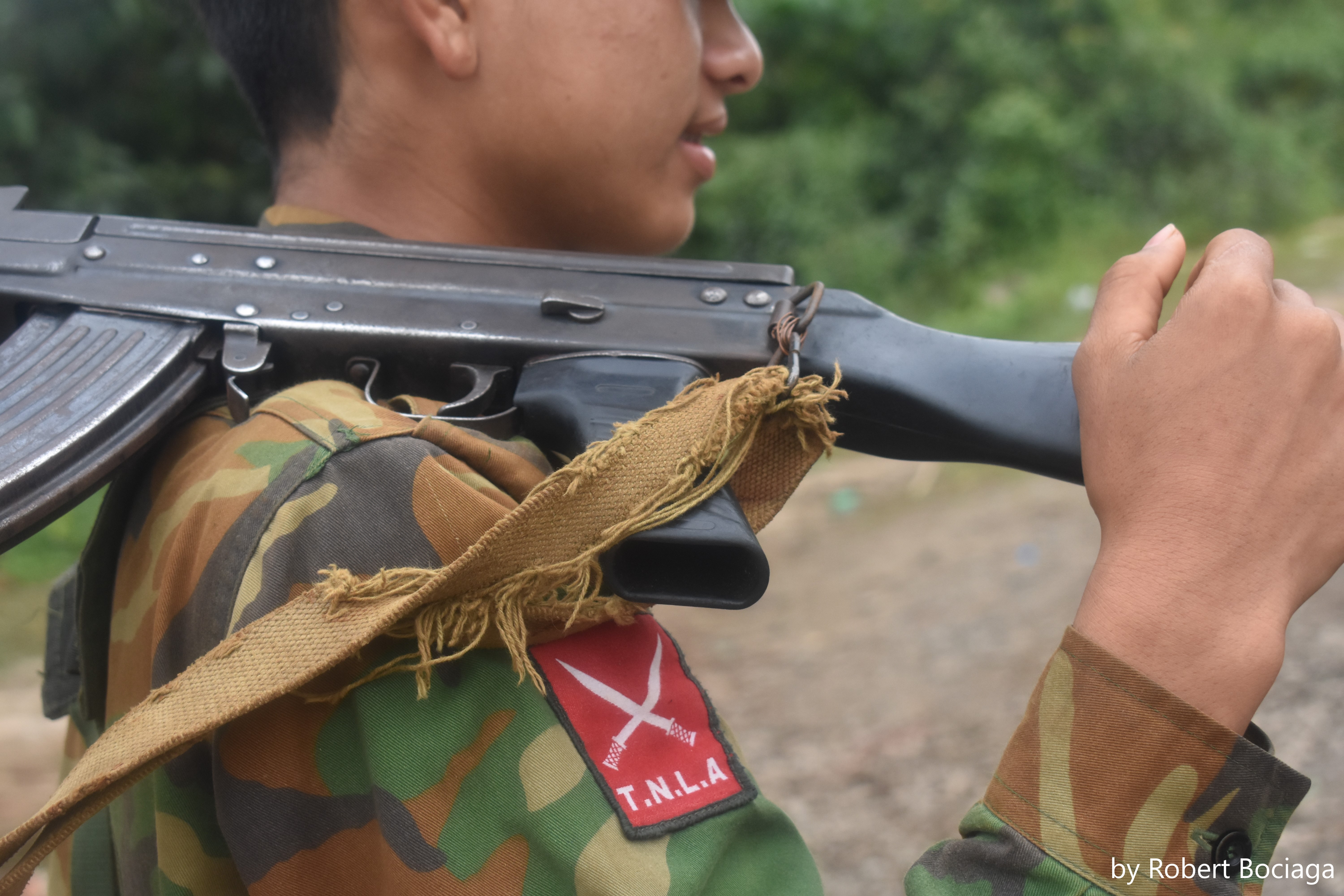
The TNLA has about 10,000 members and teams up with other ethnic armed groups against the Tatmadaw. Photo by Robert Bociaga.
Crushing enemies is an important objective of the Tatmadaw, which tries to position itself as the defender of the Myanmar people. The remote hillside villages of Shan State are also more valuable than one would suspect at first glance. The surrender of the rebel groups will pave the way for a smooth implementation of the economic corridor (known as CMEC) envisioned between Myanmar and China. Chaired by Aung San Suu Kyi and a part of Belt and Road Initiative, the project is meant to link China with the Indian Ocean. At the same time, the project may bulldoze the rights and livelihoods of people residing in northern Shan State.
With the construction of the planned railway, for instance, “farmers won’t be able to cross on the other side of the tunnel that passes through their properties,” reports Myo Zaw Win of the Heartland Foundation, a Lashio-based NGO. “They will effectively lose access to their farmlands.”
So far during the public consultation process, the objections raised by affected locals have been ignored. Also, general awareness of the implications of the railway project remains very low among the citizens of Shan State. Moreover, the project will require a large supply of electricity, which may be generated by new large dams – the construction of which could potentially displace other communities.
Locals already have a vivid example of inability of the government to provide compensation for the losses caused by massive investment projects: a coal-powered plant, located in the southern corner of Shan State, in Pinlaung township. Dating back to Myanmar’s days of military dictatorship, the Tigyit Power Plant remains owned by Eden Group, a business conglomerate that has benefited from close links to high-ranking generals.
In May 2020, the NLD administration, with the approval of the Shan State government, rejected a motion to shutter the polluting plant. The bill was proposed by Sai Tun Aye, a member of the Shan Nationalities League for Democracy (SNLD), citing the long list of the health problems suffered by local people.
The SNLD has become the strongest ethnic party in Shan State and has been applauded for urging Aung San Suu Kyi’s government to conduct promised reforms.
In an interview with The Diplomat, Sai Lynn Myat, a politician representing SNLD in the Shan State parliament, complained that Aung San Suu Kyi “only evokes the spirit of the Panglong Agreement, dodging the responsibility to implement its terms.”
Under Aung San Suu Kyi and her NLD government, the peacemaking process had been stalled prior to the start of the election campaign in September. And being the dominant political party among the majority Bamar, the NLD will not be in trouble even if it loses the votes of some of the minority people. This has allowed Aung San Suu Kyi to avoid engaging in a meaningful debate about the federalization of the country.
Meanwhile, the SNLD candidates will not run in constituencies affected by the polluting power plant in the upcoming elections. Sai Lynn Myat explains the party had low chances of winning there thanks to the strong ethnic loyalty of the Pa-O people, whose leaders are at odds with the Shans.
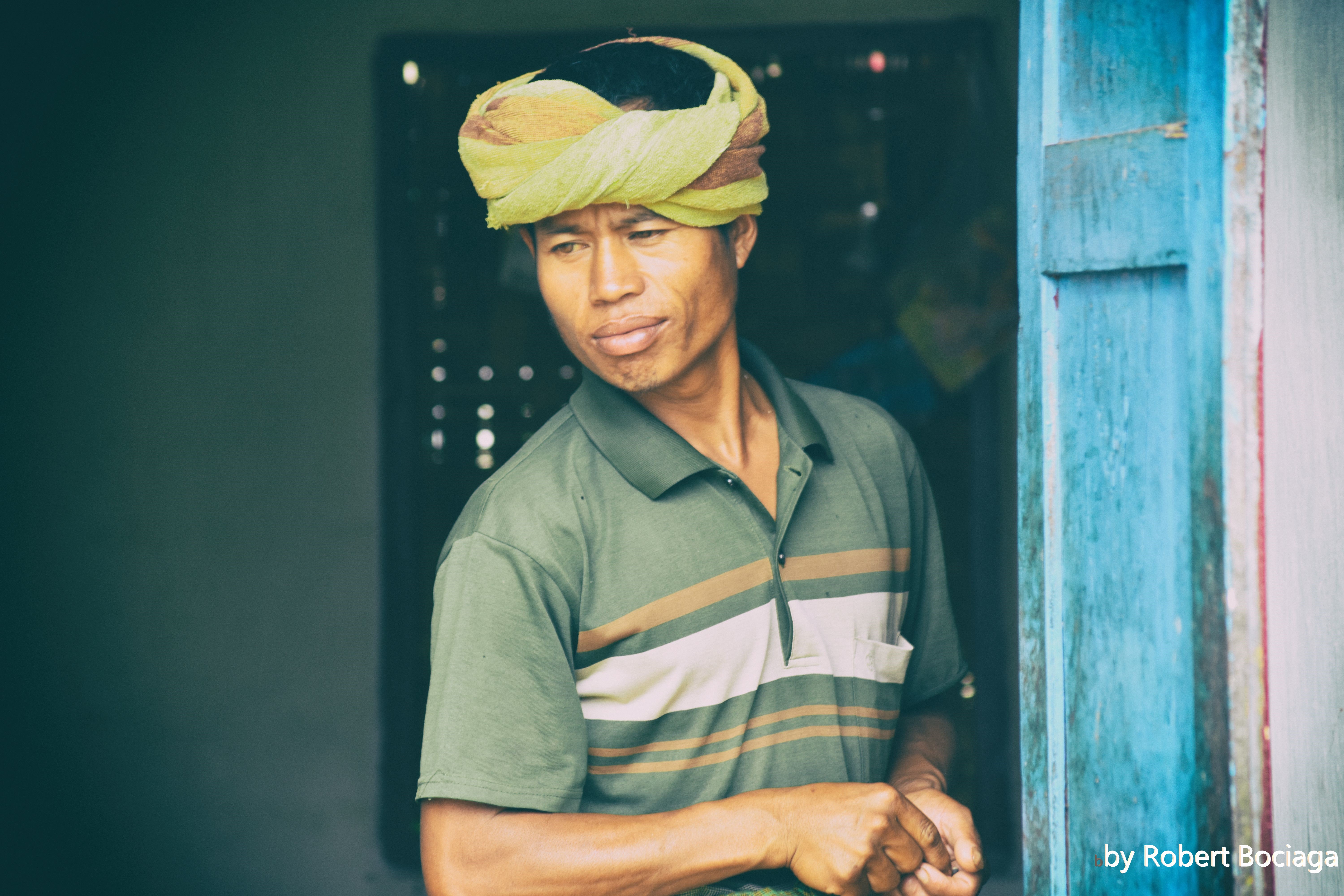
Pa-O people, distinguishable by their turbans, will never visit a Shan Buddhist monk. Photo by Robert Bociaga.
Unlike the SNLD, the Pa-O National Organization (PNO) has given a green light to local coal-powered plants, providing they meet standards set by the government.
It is worth noting that by not introducing its own candidates in these constituencies, the SNLD is simply succumbing to the history of ethnic quarrels, and failing to build new bridges. This goes against its declaration, issued in June, promising to transform the party from an ethnic-based one to a state-based one.
Pa-O people, Myanmar’s 7th largest ethnic group, were not only anti-British and anti-feudal; they also signed a lasting ceasefire agreement with the Myanmar government in the 1990s, which served to exemplify the military government’s success in the peacemaking process. Nevertheless, in the views of many observers, the PNO has been subsequently co-opted through the granting of business rights in the Pinlaung coal mining project and the Golden Island Hotel located at Inle Lake. Moreover, in the 2010 and 2015 elections, the PNO agreed not to compete in constituencies where the military-backed USDP was running. (This pact with the USDP was ended this year.)
But some Pa-O fighters have not laid down their weapons, an indication both of the sheer complexity of Myanmar’s internal ethnic politics, and that the prevailing narratives about the country are too narrow.
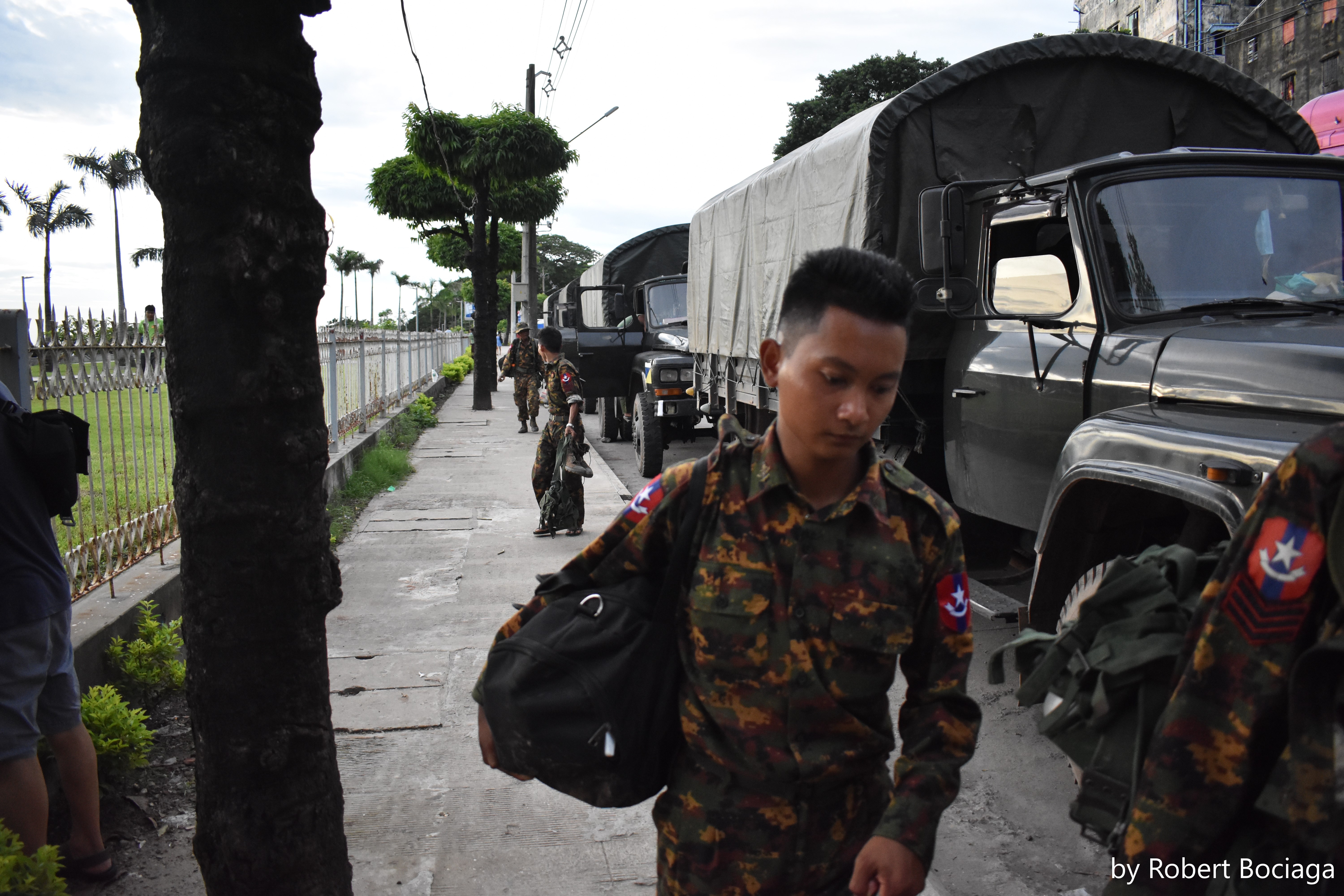
The Tatmadaw had a budget of $2.4 billion in FY 2019-2020, and has purchased weapons from China, North Korea, India, Israel, the Philippines, Russia and Ukraine. Photo by Robert Bociaga.
Neither the Myanmar army nor the ethnic armed groups should be viewed through the tinted spectacles of ethnic solidarity alone. Both sides of the conflict have been accused of human rights violations. Many regular people are either bystanders, not supporting any side of the conflict, or victims of the competition over resources. The region’s rich deposits of precious minerals, stones, gems and timber are deeply connected to the origins of Myanmar’s internal conflicts, as previously described in this article published by The Diplomat.
The debate over what share of the revenues should stay in Shan State, and what should be split with the central government, is an additional source of dispute.
Although the NLD remains the first Bamar-majority political party to claim that it wants to establish a federal union, it has done very little to materialize it. Apart from failing to move forward the peace process with ethnic armed groups, the party excluded ethnic parties from cabinet positions, despite working closely with them during the military dictatorship.
A coalition government is unlikely to be formed with the ethnic parties anytime soon, but everyone knows that the charm of the NLD depends on its iconic leader. Aung San Suu Kyi is now 75 years of age, and should finally start preparing the ground for a genuine path toward federalization. After she disappears from the political scene, the void will be yawning, and the narrow window for securing a lasting peace could close forever.
Robert Bociaga is a traveling photojournalist specializing in international affairs. Based in Southeast Asia, he focuses on economic and social issues around culture change, urbanization, political marginalization, poverty, religion and the destruction of nature. He holds a Master’s degree in law.













